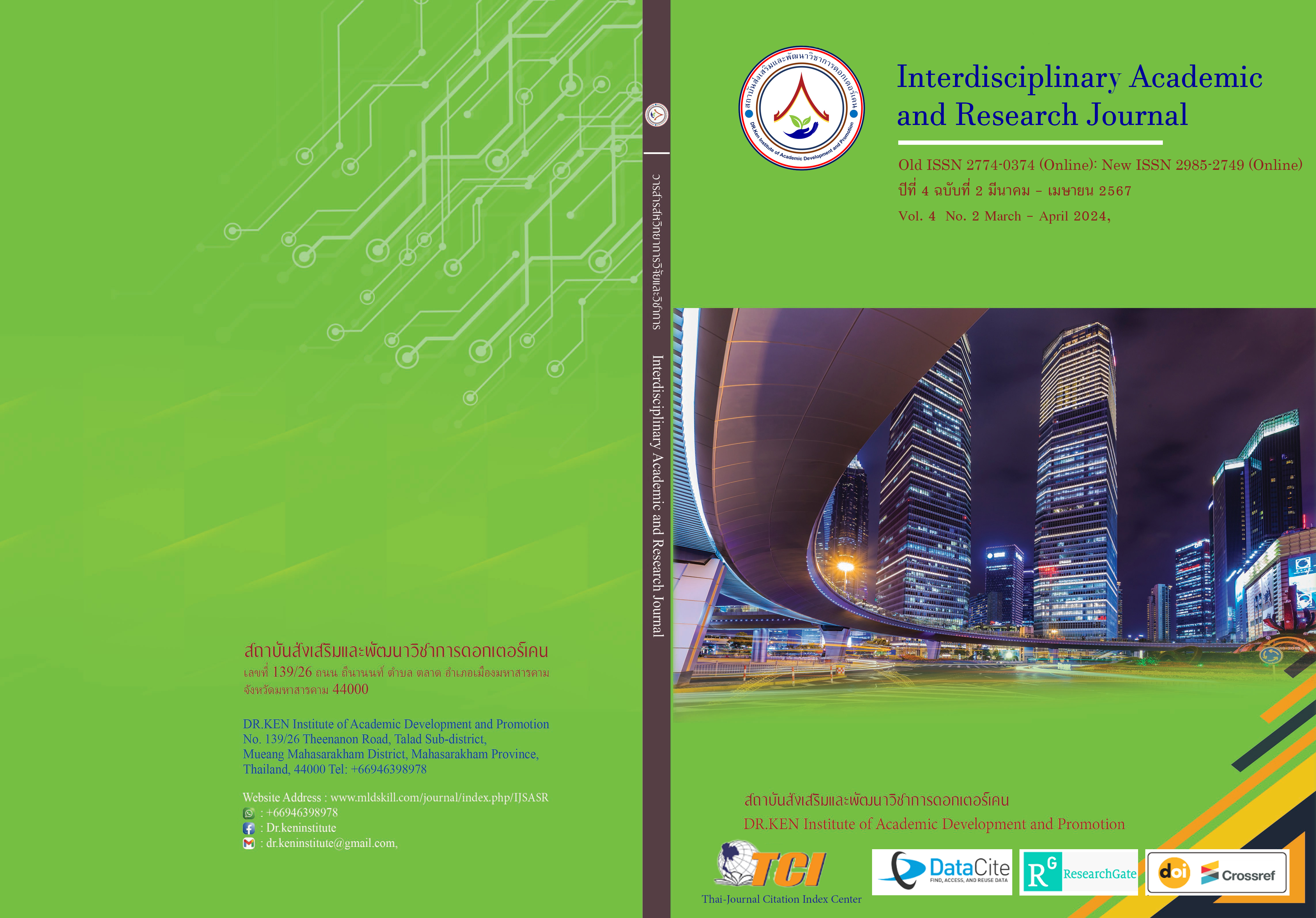The Charismatic Leadership and Exercise of Administrative Authority in Bangkok, 2022, Mr. Chatchat Sitthipanth
DOI:
https://doi.org/10.60027/iarj.2024.274741Keywords:
Charismatic Leadership;, Authority; , Chatchat SitthipanthAbstract
Background and Aims: Bangkok has had administrators in the political arena who are tied to traditional thinking, emphasizing working within the framework of authoritative power. However, with the recent election, the public seeks a new leader with fresh perspectives and a new approach to governance. Mr. Chatchat Sittiphan possesses the qualities that align with the desired change, making him the chosen candidate for the position of Governor of Bangkok. In this thesis aims; (1) To study the relationship between charismatic leadership and the exercise of administrative authority in Bangkok in the year 2022, Mr. Chatchat Sitthipan conducted research. And (2) To investigate the factors of charismatic leadership that influence the exercise of administrative authority in Bangkok.
Methodology: In this research, the sample group consists of 400 residents from the 50 districts of Bangkok. The data collection instrument utilized is a questionnaire with a confidence level of 0.978. The statistical methods employed for data analysis include frequency distribution, percentage, mean, standard deviation, Pearson's product-moment correlation coefficient analysis, and multiple regression analysis.
Results: 1) The relationship between charismatic leadership and the exercise of authority in managing Bangkok at a statistically significant level of 0.01 and 2) Factors of charismatic leadership influencing the exercise of authority in managing Bangkok at a statistically significant level of 0.01
Conclusion: Statistically significant findings at a significance level of 0.01 show that charismatic leadership has a significant impact on authority in managing Bangkok, highlighting its important role in governance and decision-making processes within the city.
References
เจด็จ คชฤทธิ์, เจนจิรา เจนจิตรวาณิช,หทัยรัตน์ อ่วมน้อย และฤทัย สำนียงเสนาะ. (2562). ธรรมเพื่อชีวิตที่ดีงาม: แบบอย่างจากพระบาทสมเด็จพระเจ้าอยู่หัวภูมิพลอดุลยเดช รัชกาลที่ 9. วารสารวไลยอลงกรณ์ปริทัศน์(มนุษยศาสตร์และสังคมศาสตร์), 9(1), 179-188.
ธันยาภรณ์ นวลสิงห์, ยุวธิดา ชาปัญญา และชีวรัตน์ ศีลพันธุ์. (2556). ผู้บริหารกับการสร้างแรงจูงใจ. วารสารมหาวิทยาลัยราชภัฏร้อยเอ็ด, 10(2), 45-53.
นุช สัทธาฉัตรมงคล และอรรถพล ธรรมไพบูลย์. (2559). ผู้นำการเปลี่ยนแปลงในยุคโลกาภิวัฒน์สู่การพัฒนาอย่างยั่งยืน. วารสารธุรกิจปริทัศน์, 8(1), 167-182.
บีบีซีไทย. (2565). ชัชชาติ สิทธิพันธุ์: ผู้ว่าฯ กทม. ผู้คว้าคะแนนเลือกตั้งสูงสุดในประวัติศาสตร์. Retrieved on 24 August 2022, from: https://www.bbc.com/thai/61545581
บุญช่วย โชติว์โส. (2562). บทบาทของผู้นำในกระบวนทัศน์ใหม่. วารสารวิชาการธรรมทรรศน์, 19(1), 297-307.
ปัญญาพลวัตร และพิชาย รัตนดิลก ณ ภูเก็ต. (2565). ผู้ว่าฯ กรุงเทพฯและความท้าทาย. Retrieved on 23 August 2022, from: https://mgronline.com/daily/detail/9650000055390
พลวศิษฐ หล้ากาศ. (2564). ประเด็นความท้าทายที่มีต่อบทบาทนักทรัพยากรมนุษย์ในอนาคต. วารสารวิจัยวิชาการ, 4(2), 251-260.
มติชนสุดสัปดาห์. (2565). E-DUANG: ปรากฎการณ์ ชัชชาติ สิทธิพันธุ์ กับ การเลือกใหม่ ทางการเมือง. Retrieved on 24 August 2022, from: https://www.matichonweekly.com/e-daung/article_578500
วันชัย มีชาติ และธีระพล เกรียงพันธุ์. (2556). กรุงเทพมหานคร: ความท้าทายการบริหารจัดการเมือง. วารสารสิ่งแวดล้อม, (17)2, 60-71.
สุนิตย์ อาษาจิตร และโสภณ เพ็ชรพวง. (2565). ภาวะผู้นำเชิงจริยธรรมของผู้บริหารที่ส่งผลต่อคุณธรรมจริยธรรมของครูและนักเรียนโรงเรียนเอกชน สังกัดสำนักงานศึกษาธิการจังหวัดนครปฐม. วารสารวิชาการสถาบันเทคโนโลยีแห่งสุวรรณภูมิ, 8(2), 185-201.
สุเมธ แสงนิ่มนวล. (2552). ภาวะผู้นำกับธรรมาภิบาลในการบริหารงานองค์กรปกครองส่วนท้องถิ่น. นนทบุรี: สถาบันพระปกเกล้า.
อติพร เกิดเรือง. (2560). ข้อเสนอเชิงนโยบายต่อการปรับกระบวนทัศน์ในการบริหารงาน กรณีศึกษาสำนักงานคณะกรรมการกิจการกระจายเสียง กิจการโทรทัศน์ และกิจการโทรคมนาคมแห่งชาติ (กสทช.). วารสารราชนครินทร์, 14(1), 153-159.
อรภัคสุวรรณภักดี และอภิรัตน์ กังสดารพร. (2565). วิสัยทัศน์ผู้นํากับความสําเร็จในการพัฒนาชุมชนเมือง. วารสารวิชาการสถาบันวิทยาการจัดการแห่งแปซิฟิค, 8(3), 339-348.
Bass, B. M. (1985). Leadership and performance beyond expectations. New York: The Free Press.
Conger, J.A., & Kanungo, R.N. (1998). Charismatic leadership in the organization. Thousand Oaks: SAGE Publication.
House Rj.A. (1977). Theory of charismatic of leadership. In J.L. Pieree & J.W: Newstrom.
House, R.J. (1977). A 1976 theory of charismatic leadership. In hurt, J.G., &Larson, L. (Eds.), leadership: the abutting edge. Carbondale: Southern Illinois University Press.
Lussier, R.N. & Axhua, C.R. (2001). Leadership: Theory, application, skill development. Ohio: South-Western College.
Robbins, S.P. (1993). Organizational Behavior: Concepts Controversies and Applications. New York: Prentice–Hall Inc.
Stogdill, R.M. (1974). Handbook of Leadership. New York: Free Press.
Walker, J., & Almond, P. (2010). Interpreting statistical findings: A guide for health professionals and students. New York: McGraw-Hill.
Weber, M. (1947). The Theory of Social and Economic Organization. New York: Free Press.
Yamane, Tayo. (1973). Statistics: an introductory analysis. New York: Harper & Row.
Yukl, G.A. (2008). Leadership in organizations. 6th edition. New York: Prentice – Hill.
Downloads
Published
How to Cite
Issue
Section
License
Copyright (c) 2024 Interdisciplinary Academic and Research Journal

This work is licensed under a Creative Commons Attribution-NonCommercial-NoDerivatives 4.0 International License.
Copyright on any article in the Interdisciplinary Academic and Research Journal is retained by the author(s) under the under the Creative Commons Attribution-NonCommercial-NoDerivatives 4.0 International License. Permission to use text, content, images, etc. of publication. Any user to read, download, copy, distribute, print, search, or link to the full texts of articles, crawl them for indexing, pass them as data to software, or use them for any other lawful purpose. But do not use it for commercial use or with the intent to benefit any business.
















.png)


